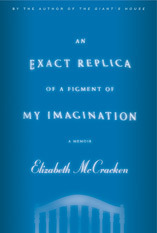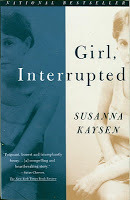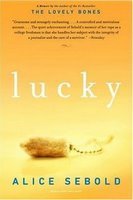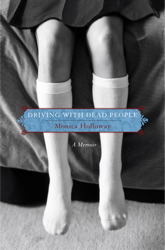Fresh Writing: Memoir & Time Travel

When we write memoir, what we are actually doing is taking a journey—with story as our vehicle—into the lost, hidden and/or protected parts of our earlier "selves." IE: I'm going to tell you about my still born baby, An Exact Replica of a Figment of my Imagination by Elizabeth McCracken, or the nervous breakdown my mother had when I was little, The Liar's Club by Mary Karr, or the year I admitted myself to an mental institution, Girl Interrupted by Susanna Kaysen, or the years my father molested me and my sisters, Driving with Dead People by Monica Halloway.
Each of these writers, and I would suggest all memoirists, go on a mission into the shadows and indeed relive experiences of the past—it could be the recent past or the far distant past but no matter, unless you are writing about this moment NOW, you are writing about the past and that is a form of time travel.
Equipped with our computers, our courage, pots of tea or coffee and a few hours on the clock each day, we lower ourselves down into the past, sit ourselves down somewhere on the time line and start looking around with a flashlight, or a lamp or perhaps a hearty fire we've built at the hearth. We then pull out story telling tools and start describing what we see via written description. EG: what's in front of you, behind you, over your head, under your feet, what city are you in, what state, what country, what's going on with nature, what is moving around you (cars, people, butterflies), who are the other people in this place, what are they wearing, carrying, saying, suggesting, what are you wearing, carrying, feeling, tasting, touching, smelling, seeing and saying.
 What comes next in our observation is the obvious response to what you are describing or remembering. EG: What the heck do you feel about all that's going on and what you do, as the observer of all that is going on feel about it now? What is surprising, amazing, stunning, remarkable, revelatory and inspiring? What is scary about what is going on? What is different that what you expected? What is important?
What comes next in our observation is the obvious response to what you are describing or remembering. EG: What the heck do you feel about all that's going on and what you do, as the observer of all that is going on feel about it now? What is surprising, amazing, stunning, remarkable, revelatory and inspiring? What is scary about what is going on? What is different that what you expected? What is important?
It all sounds simple enough, when written about in this way but memoir writing is hardly simple. In fact, it is one of the hardest things I know because a writer isn't going back and lowering herself into any old past and sitting on any old timeline with a flashlight, she is going back to her own past and her timeline and as a result reliving an event that was so hard, so heartbreaking, so frightening and/or so challenging, it had to be shut away into the shadows in order that she could carry on with her life.
On her journey back, a writer can forget that she is here, now, telling the story and be caught in the past like one is caught in a terrible dream. The brain, its messages wired into primal places of limbic region will send all manner of signals about how the body should respond because the brain doesn't know the difference between what has happened and what is happening. A writer will find herself crying, laughing, sweating, frozen with shock and even scared to death as if that rapist is at her back again and about to throw her down to the ground (Lucky by Alice Seabold).
 Blink, stand up, shake your arms and your legs and take a walk around the block, but still the writer is likely shaken to the core by what she's relived in that dark place. As Mary Karr says of writing memoir: "it takes endurance."
Blink, stand up, shake your arms and your legs and take a walk around the block, but still the writer is likely shaken to the core by what she's relived in that dark place. As Mary Karr says of writing memoir: "it takes endurance."
What is most interesting to me in this process of writing about the past, especially about our childhood, is that we will also meet our selves as we were all those years ago. And when this happens, when we come to our former self face to face, we have a surprising, unexpected and glorious opportunity to be quiet and to listen. In fact, I would suggest that this "meeting" is ultimately the goal of what we are doing and the way to find voice in our memoir narrative. The part of ourselves, that lost part in many cases, I believe has been waiting for our return and is eager to reintegrate with the current self. I see this phenomenon a lot like one might think of a split hair.
 Imagine, as life happens to us, at age three, four, seven, ten and so on, we have sharp, intense, scary, even life threatening events take place. At each of these junctures, the hair—that is the life energy—splits a little from the central core. A lifetime of these events leaves us with a heedful of split ends. In going back, interacting and learning from our past experience, we smooth the ends back into the central line and bring ourselves to wholeness in a way—gathering up the energy of those split off parts.
Imagine, as life happens to us, at age three, four, seven, ten and so on, we have sharp, intense, scary, even life threatening events take place. At each of these junctures, the hair—that is the life energy—splits a little from the central core. A lifetime of these events leaves us with a heedful of split ends. In going back, interacting and learning from our past experience, we smooth the ends back into the central line and bring ourselves to wholeness in a way—gathering up the energy of those split off parts.
Here is where the work gets tricky. When a writer goes back in time, dropping into the past, she sometimes forgets that she is both part and separate from that person of the past. It is also very important to make note that the future person—that time traveling writer—is without the wisdom of that past part of herself and so the writer/future being/time traveler has to do some hard work in order to step down and let the person from the past have some room to speak in her native tongue. It's a bit like meeting an old friend in the coffee shop and catching up on how things are going.
The reason we split off from ourselves though is because it was too scary to stay and so when we left, we actually abandoned a part of ourselves and that self has a view that is very different than the one who got away.
[image error]An example I would supply is from my own writing in Blackbird where I went back on the timeline to my earliest memory or about five years of age. I dropped down on the time line and very quickly met little Jenny—age five—full of vitality, energy, story and sadness. My goodness could that child talk and I had forgotten that part of my lost self. Talk, talk, chat, chat, so much to say. Like most children. God love them.
Little Jenny, like a child would be, was also busy. She was nervous. She darted around and changed the subject quite a bit. Jenny of 1968 was like a moth that didn't want to be caught, all beating wings and dust. And I, in meeting this little one, was thirty-four years old with a baby napping for just two hours. I was, I hate to say, a taskmaster on a mission to "write a book, sell that book, earn a living and prove to my husband I'm was a dead beat." In short, I was not much for indulging little Jenny and her evasive ways. Once I found this remarkable little being, I wanted the girl to talk and talk NOW.
In response to my demands, Jenny didn't settle down. No. She just vanished. Poof. Child gone.
Intially, furious that I had found her and then lost her, I shrugged Jenny off. What did I care? I told myself, as a former reporter I was smart and knew how to tell a story. I didn't need her, I reasoned and preceded to write about my life (and my memory) as a detached, smart, know-it-all adult who was busy and full of herself.
My writing teacher (and all writers of this kind of craft need a teacher along the way) told me that I was very smart and knew how to tell a story but that was simply not good enough. "Get closer," he insisted. "Show me your heart."
That hurt.
My teacher was telling me that I had no heart and eventually I realized that my truest heart was in that chest of Jenny, that worried, frightened, wide eyed, busy little dear.
This was a brutal but important lesson. I could not bully my smaller self, not without becoming the very thing that Jenny feared the most—another untrustworthy adult. I had to become humble, deeply humble and offer my self as her servant. I brought Jenny what she craved—M&M's and my typewriter. She talked and I typed. That's how it worked.
Little Jenny spoke to me, oh yes, she spoke plenty, but it wasn't my on my terms, it was on hers.
She taught me what was important to a child, what was really important and this was a lesson that served me well in mothering my children too. For children really do have a magical perspective and a point of view that is often tossed to the side by the more cynical and jaded adult.
In paying attention to Jenny (and this took a good deal of time and re-learning and patience on my part) I discovered the power of present tense writing and heavy attention to detail and the senses. Children live in the moment, they are wrapped up in their senses of taste, touch, smell, sound and sight and they are entranced by the smallest details that most adults would barely notice.
If you don't know what children are like, because you don't have them or don't spend time with them, go watch kids. Go talk to them. Go ask them what is important and soon, they will tell you. A child's parents are very important, her room, her stuffed animals, her toys, her siblings and her favorite (and least favorite) foods. All very important.
In writing Blackbird from the voice of Jenny, I asked her questions and talked to her about what mattered. From my questions came the stories of cats winding around each other in the hallway, warm banana nut bread dripping with melted pats of butter, That Man cologne, snarling big brothers, wide warm shafts of sunlight over shag carpet and the fast slap of an embrace as I ran to greet my cousin Tracy in her big house.
I relived my past with Jenny as my guide and for eighteen months walked through the dark halls and deep losses and worrisome nights. When she cried, I cried. When she worried, I worried. When she asked questions, I asked questions. When she needed to rest, I rested. When she needed a cookie, I needed a cookie. And when she was done, I was done.
I gathered little Jenny up into my arms to took her forward in time so that she could live with me and continue to inform my life with her unique and important perspective.
So often I work with writers who are furious about their inability to capture the right "voice" in their story. I have worked with writers, for years, who cannot seem to nail down the sound of their story teller and it is always the case that this writer has not surrendered to herself at the age that the story took place. That is a shame. Many writers will actually attempt to abuse the child they want to learn about abuse from. They will be filled with fear and outrage and make demands and not listen as well as they should.
A writer is not serving her life energy in this way and she is not paying attention to what needs to be seen. This kind of writer is hungry for the meat of the story, in hopes she'll return with some great body of writing but in the process she is doing the same harm to herself that was done long ago. It's a kind crazy cannibalism.
I can only tell a writer this. Be careful with yourself when you are in that past. Speak the language of your former self. Listen closely and write down every damn detail that former part of your self offers up. Become the secretary. Only in the most humble of place, as the writer who nods and types and keeps her mouth sealed in the process, can we get the story we search for and nail the "voice."
I've often suggested writers even perform rituals with the former parts of themselves, taking themselves out to a meal or for a sundae or writing a letter. It's always good to get out photos of that former self, perhaps make a little alter to your former self that is close to where you write so you can look, with a revert and sacred eye, at your self as you were so long ago. It all helps
Memoir is simple task but also a complexity. It is time travel and it is voice driven. If you cannot find the voice, you cannot tell the tale in a way that holds any kind of real interest or attention.
When you cannot find your voice, you know it in your gut. It's this twisting, panicked feeling of "not rightness" and your words are stiff and whiny and hard to hear. Your teacher will tell you this, in more gentle terms, but she will (or should tell you) and that is the time for the writer to go back down into the past, once again, sit down on the time line and look with even more care.



